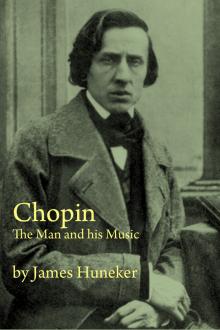Haydn - J. Cuthbert Hadden (ebook audio reader txt) 📗

- Author: J. Cuthbert Hadden
Book online «Haydn - J. Cuthbert Hadden (ebook audio reader txt) 📗». Author J. Cuthbert Hadden
Haydn was supposed to have lessons from two undistinguished professors named Gegenbauer and Finsterbusch. But it all amounted to very little. There was the regular drilling for the church services, to be sure: solfeggi and psalms, psalms and solfeggi--always apt to degenerate, under a pedant, into the dreariest of mechanical routine. How many a sweet-voiced chorister, even in our own days, reaches manhood with a love for music? It needs music in his soul. Haydn's soul withstood the numbing influence of pedantry. He realized that it lay with himself to develop and nurture the powers within his breast of which he was conscious. "The talent was in me," he remarked, "and by dint of hard work I managed to get on." Shortly before his death, when he happened to be in Vienna for some church festival, he had an opportunity of speaking to the choir-boys of that time. "I was once a singing boy," he said. "Reutter brought me from Hainburg to Vienna. I was industrious when my companions were at play. I used to take my little clavier under my arm, and go off to practice undisturbed. When I sang a solo, the baker near St Stephen's yonder always gave me a cake as a present. Be good and industrious, and serve God continually."
A Sixteen-Part Mass!
It is pathetic to think of the boy assiduously scratching innumerable notes on scraps of music paper, striving with yet imperfect knowledge to express himself, and hoping that by some miracle of inspiration something like music might come out of it. "I thought it must be all right if the paper was nice and full," he said. He even went the length of trying to write a mass in sixteen parts--an effort which Reutter rewarded with a shrug and a sneer, and the sarcastic suggestion that for the present two parts might be deemed sufficient, and that he had better perfect his copying of music before trying to compose it. But Haydn was not to be snubbed and snuffed out in this way. He appealed to his father for money to buy some theory books. There was not too much money at Rohrau, we may be sure, for the family was always increasing, and petty economies were necessary. But the wheelwright managed to send the boy six florins, and that sum was immediately expended on Fux's Gradus ad Parnassum and Mattheson's Volkommener Capellmeister--heavy, dry treatises both, which have long since gone to the musical antiquary's top shelf among the dust and the cobwebs. These "dull and verbose dampers to enthusiasm" Haydn made his constant companions, in default of a living instructor, and, like Longfellow's "great men," toiled upwards in the night, while less industrious mortals snored.
Juvenile Escapades
Meanwhile his native exuberance and cheerfulness of soul were irrepressible. Several stories are told of the schoolboy escapades he enjoyed with his fellow choristers. One will suffice here. He used to boast that he had sung with success at Court as well as in St Stephen's. This meant that he had made one of the choir when visits were paid to the Palace of Schonbrunn, where the Empress Maria and her Court resided. On the occasion of one of these visits the palace was in the hands of the builders, and the scaffolding presented the usual temptation to the youngsters. "The empress," to quote Pohl, "had caught them climbing it many a time, but her threats and prohibitions had no effect. One day when Haydn was balancing himself aloft, far above his schoolfellows, the empress saw him from the windows, and requested her Hofcompositor to take care that 'that fair-headed blockhead,' the ringleader of them all, got 'einen recenten Schilling' (slang for 'a good hiding')." The command was only too willingly obeyed by the obsequious Reutter, who by this time had been ennobled, and rejoiced in the addition of "von" to his name. Many years afterwards, when the empress was on a visit to Prince Esterhazy, the "fair-headed blockhead" took the cruel delight of thanking her for this rather questionable mark of Imperial favour!
"Sang like a Crow"
As a matter of fact, the empress, however she may have thought of Haydn the man, showed herself anything but considerate to Haydn the choir-boy. The future composer's younger brother, Michael, had now arrived in Vienna, and had been admitted to the St Stephen's choir. His voice is said to have been "stronger and of better quality" than Joseph's, which had almost reached the "breaking" stage; and the empress, complaining to Reutter that Joseph "sang like a crow," the complacent choirmaster put Michael in his place. The empress was so pleased with the change that she personally complimented Michael, and made him a present of 24 ducats.
Dismissed from St Stephen's
One thing leads to another. Reutter, it is obvious, did not like Haydn, and any opportunity of playing toady to the empress was too good to be lost. Unfortunately Haydn himself provided the opportunity. Having become possessed of a new pair of scissors, he was itching to try their quality. The pig-tail of the chorister sitting before him offered an irresistible attraction; one snip and lo! the plaited hair lay at his feet. Discipline must be maintained; and Reutter sentenced the culprit to be caned on the hand. This was too great an indignity for poor Joseph, by this time a youth of seventeen--old enough, one would have thought, to have forsworn such boyish mischief. He declared that he would rather leave the cathedral service than submit. "You shall certainly leave," retorted the Capellmeister, "but you must be caned first." And so, having received his caning, Haydn was sent adrift on the streets of Vienna, a broken-voiced chorister, without a coin in his pocket, and with only poverty staring him in the face. This was in November 1749.
CHAPTER II(VIENNA--1750-1760)
Vienna--The Forlorn Ex-Chorister--A Good Samaritan--Haydn Enskied--Street Serenades--Joins a Pilgrim Party--An Unconditional Loan--"Attic" Studies--An Early Composition-- Metastasio--A Noble Pupil--Porpora--Menial Duties--Emanuel Bach-- Haydn his Disciple--Violin Studies--Attempts at "Programme" Music--First Opera--An Aristocratic Appointment--Taken for an Impostor--A Count's Capellmeister--Falls in Love--Marries-- His Wife.
Vienna
The Vienna into which Haydn was thus cast, a friendless and forlorn youth of seventeen, was not materially different from the Vienna of to-day. While the composer was still living, one who had made his acquaintance wrote of the city: "Represent to yourself an assemblage of palaces and very neat houses, inhabited by the most opulent families of one of the greatest monarchies in Europe--by the only noblemen to whom that title may still be with justice applied. The women here are attractive; a brilliant complexion adorns an elegant form; the natural but sometimes languishing and tiresome air of the ladies of the north of Germany is mingled with a little coquetry and address, the effect of the presence of a numerous Court...In a word, pleasure has taken possession of every heart." This was written when Haydn was old and famous; it might have been written when his name was yet unknown.
Vienna was essentially a city of pleasure--a city inhabited by "a proud and wealthy nobility, a prosperous middle class, and a silent, if not contented, lower class." In 1768, Leopold Mozart, the father of the composer, declared that the Viennese public had no love of anything serious or sensible; "they cannot even understand it, and their theatres furnish abundant proof that nothing but utter trash, such as dances, burlesques, harlequinades, ghost tricks, and devils' antics will go down with them." There is, no doubt, a touch of exaggeration in all this, but it is sufficiently near the truth to let us understand the kind of attention which the disgraced chorister of St Stephen's was likely to receive from the musical world of Vienna. It was Vienna, we may recall, which dumped Mozart into a pauper's grave, and omitted even to mark the spot.
The Forlorn Ex-Chorister
Young Haydn, then, was wandering, weary and perplexed, through its streets, with threadbare clothes on his back and nothing in his purse. There was absolutely no one to whom he could think of turning. He might, indeed, have taken the road to Rohrau and been sure of a warm welcome from his humble parents there. But there were good reasons why he should not make himself a burden on them; and, moreover, he probably feared that at home he would run some risk of being tempted to abandon his cherished profession. Frau Haydn had not yet given up the hope of seeing her boy made a priest, and though we have no definite information that Haydn himself felt a decided aversion to taking orders, it is evident that he was disinclined to hazard the danger of domestic pressure. He had now finally made up his mind that he would be a composer; but he saw clearly enough that, for the present, he must work, and work, too, not for fame, but for bread.
A Good Samaritan
Musing on these things while still parading the streets, tired and hungry, he met one Spangler, a tenor singer of his acquaintance, who earned a pittance at the Church of St Michael. Spangler was a poor man--but it is ever the poor who are most helpful to each other--and, taking pity on the dejected outcast, he invited Haydn to share his garret rooms along with his wife and child. It is regrettable that nothing more is known of this good Samaritan--one of those obscure benefactors who go through the world doing little acts of kindness, never perhaps even suspecting how far-reaching will be the results. He must have died before Haydn, otherwise his name would certainly have appeared in his will.
Haydn Enskied
Haydn remained with Spangler in that "ghastly garret" all through the winter of 1749-1750. He has been commiserated on the garret-- needlessly, to be sure. Garrets are famous, in literary annals at any rate; and is it not Leigh Hunt who reminds us that the top story is healthier than the basement? The poor poet in Pope, who lay high in Drury Lane, "lull'd by soft zephyrs through the broken pane," found profit, doubtless, in his "neighbourhood with the stars." However that may be, there, in Spangler's attic, was Haydn enskied, eager for work--work of any kind, so long as it had fellowship with music and brought him the bare means of subsistence.
"Scanning his whole horizon In quest of what he could clap eyes on,"
he sought any and every means of making money. He tried to get teaching, with what success has not been recorded. He sang in choirs, played at balls and weddings and baptisms, made "arrangements" for anybody who would employ him, and in short drudged very much as Wagner did at the outset of his tempestuous career.
Street Serenades
He even took part in street serenades by playing the violin. This last was not a very dignified occupation; but it is important to remember that serenading in Vienna was not the lover's business of Italy and Spain, where the singer is accompanied by guitar or mandoline. It was a much more serious entertainment. It dated from the seventeenth century, if we are to trust Praetorius, and consisted of solos and concerted vocal music in various forms, accompanied sometimes by full orchestra and sometimes by wind instruments alone. Great composers occasionally honoured their patrons and friends with the serenade; and composers who





Comments (0)